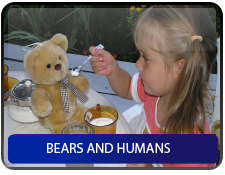Human interaction with bears has long inspired popular imagination and found expression in Bulgarian folklore. The great and mighty bear, according to popular belief, was capable of giving back health to the sick and ailing. Thus, when a bear trainer with a dancing animal would come to a village, people would lie prostrate on the ground for the bear to ‘dance on them’ in what was, in fact, a health-giving massage. Bear fur, on the other hand, was believed to cure fright. A few hairs would be set alight and the smoke would drive away the memory of a scary occurrence. Even the expression ‘The bear may be scared but I am not!’ was used as an incantation to cast away fear. A host of proverbs and popular sayings reiterate man’s strong spiritual bond with the beast: ‘A hungry bear will not dance,’ ‘Eats like a bear, works like a bug,’ ‘a bear’s favor’ (doing more harm than good), ‘Those scared of bears should not go into the woods,’ or ‘If the bear is not trampling on your rye field, don’t bother it.’
Modern man has kept much of the strong spiritual bond with bears built over the centuries. The tales and legends of many peoples are populated with these wise, friendly, gentle giants, often portrayed with human-like features. Our children play with teddy bears and cuddle them in their sleep. The attitudes of the great majority of Bulgarians, even those living near bear habitats, are generally positive. Locals may be afraid of bears, which is natural and correct as it helps keep the mutual respect between them, but they do not think bears should be killed.
Video:
| Photo Gallery: |


































